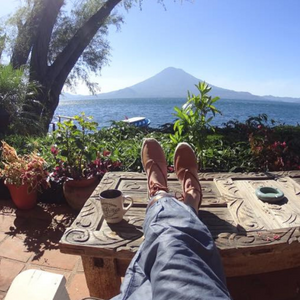Why Self-Care Matters Most In Leadership (Yes, for you too!)
You know the first things you are quick to sacrifice when it comes to meeting all the demands of work (self-care, well-being, downtime)? Well they are the last things you should.
 If you have been able to reach and stay at the executive level, then you are more likely to have learned that self-care is inextricable to leadership. You have ideally dropped the cultural self-sacrifice story a long time ago in your leadership journey.
If you have been able to reach and stay at the executive level, then you are more likely to have learned that self-care is inextricable to leadership. You have ideally dropped the cultural self-sacrifice story a long time ago in your leadership journey.
A study of self-care among executive leadership in healthcare organizations found that “Leaders’ with high self-care ratings were likely to be from an organization with a high profit margin, while leaders with low ratings were likely to be either in their role for less than a year or from an organization with a lower profit margin.”
How much leaders practice self-care has a trickle down effect within organizations, and especially, in your own life and ability to show up.
Sacrificing Self-Care Benefits Nobody
We already know that playing the long hours game has a strong adverse impact on women’s short and long-term health relative to men. We know that a female-skewed over-conscientious approach to work can lead to emotional exhaustion. And research has shown that high work-related fatigue is even stronger for highly educated women.
Mindfulness researcher and author Jacqueline Carter shared with theglasshammer, “it was amazing to see how basically the higher you got in an organization, the higher the level of the executives, they all took time to exercise, they slept well, even despite ridiculous travel schedules and ridiculous scopes of jobs,” says Carter. “It was really clear that if you don’t start taking good care of yourself and setting good boundaries and saying no at an earlier level of your leadership journey, you’re gonna burn out.”
According to Harvard Business Review, “burnout cuts across executive and managerial levels…the major defining characteristic of burnout is that people can’t or won’t do again what they have been doing.” Identifiable characteristics include: “(1) chronic fatigue; (2) anger at those making demands; (3) self-criticism for putting up with the demands; (4) cynicism, negativity, and irritability; (5) a sense of being besieged; and (6) hair-trigger display of emotions.”
When in burnout, you lose your heart for where you’ve come to and where you’re at and what you’re doing.
Investment: Healthy You, Healthy Leadership
“I think there’s a mind-set shift that happens when people start to take this seriously, which is to go from seeing the investment of time in sleep, exercise, and mindfulness as a cost to thinking of it as an investment,” says Caroline Webb, senior adviser to McKinsey and author of How to Have a Good Day: Harness the Power of Behavioral Science to Transform Your Working Life.
“In fact, it’s not just an investment that pays back long term, it’s an investment that pays back, all the evidence suggests, rather immediately,” says Webb. “The idea of that shift—that this is not down time, it’s simply investing in your ability to have more up time—is something which I’ve seen at the heart of everybody who makes a difference in the way that they’re living their lives, and also in the way that their teams around them are living their lives.”
The Value in Reset and Renewal
There are many ideas for how to incorporate self-care into your daily routine – such as meditation, being in nature, spending pockets of time in silence, drinking more water, starting a gratitude practice, scheduling your day to include work and non-work activities, practicing affirmations, getting massages and more. The thing is when you approach these things as something else on the task list to fit in when you’re already at overload, self-care can feel like yet another chore.
Research shows it can be valuable to step away from it all, take a bigger breath and dedicate attention for yourself to reset and renew. The right health-related vacation can shift things – it can bring you back to yourself, to open perspectives and return to a center of clarity and expansiveness, with benefits that last long beyond the time you spend away.
Research has shown that “individuals who attended a spiritual retreat for 7 days experienced changes in the dopamine and serotonin systems of the brain, which boosts the availability of these neurotransmitters” that relate to positive psychological effects. Additionally, meditation retreats have shown “large effects” on anxiety, depression, stress, mindfulness and compassion. Studies have also shown improvements in physical health, tension, and fatigue.
“A one-week wellness retreat (including many educational, therapeutic and leisure activities, and an organic, mostly plant-based diet),” according to a scientific study, “resulted in substantial improvements in everything from weight to blood pressure to psychological health – and sustained at six weeks (the last check-in point of the study).”
Beth McGroarty, director of research at the Global Wellness Institute, said to Travel Weekly, “in a wellness retreat, therapies/experiences often happen in concert and over multiple days, and combining them may have unique outcomes.”
As the research report states, “Retreat experiences provide a unique opportunity for people to escape from unhealthy routines and engage in healthy practices and activities that lead to immediate and sustained health benefits.”
For transparency, the writer of this article hosts women’s retreats, and my direct experience in facilitating a space in which a woman can connect with other women in vulnerability, return to her own center, show up from this place, and impact her own life trajectory is the inspiration for my personal commitment to this work.
No Matter How You Do It…
The bottom line is that no matter how you start or improve self-care – whether taking small moments for big impact changes in your daily routine or taking a bigger break away from it all to truly reset and renew – what’s most important, on all levels, is that you do.
Writer Bio:
Aimee Hansen, freelance writer for the theglasshammer, is the Creator and Facilitator of Storyteller Within Women’s Retreats, recommended by Lonely Planet Wellness Escapes. Since 2015, she has hosted nearly 150 women across 18 intimate retreat experiences. Her Journey Into Sacred Expression Retreats involve meditation, yoga, self-exploratory writing and sacred ceremonies, all in beautiful natural surroundings. She’ll be hosting two upcoming women’s retreat events this summer – in late June and late July – on the stunning Lake Atitlan in Guatemala, for women seeking self-renewal.











